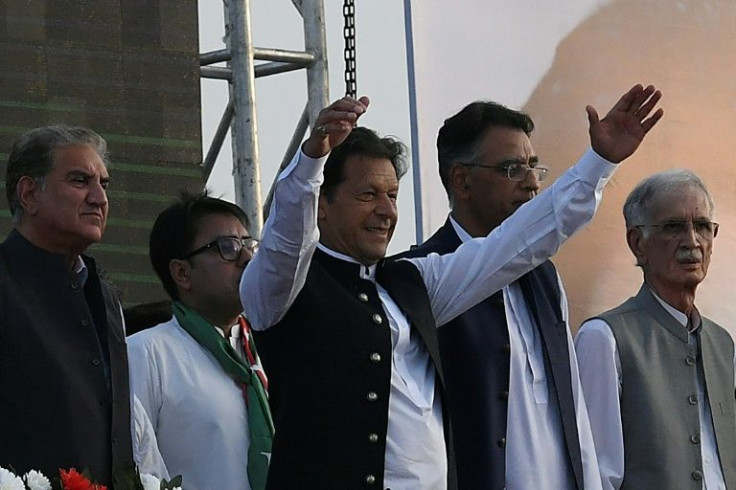China And US Play It Out In Pakistan As Imran Relies On A Piece Of Paper To Win Trust Vote

Arguably facing the biggest challenge of his political career, Pakistan premier Imran Khan's future appears to be hanging by a thread. The trust vote, which the cricketer legend will face on April 3, will decide whether the Islamic nation falls for a communist China or opts for a free market war economy of the U.S.
"On Sunday, Pakistan's fate will be decided," Khan said in a televised address.
With a key coalition ally, Muttahida Qaumi Movement-Pakistan (MQM-P), parting ways, the opposition on paper commands 175 votes to Khan's Pakistan Tehreek-e-Insaf (PTI) party's 164 in the 342-seat National Assembly.
A spirited opposition, led by former president Asif Ali Zardari and ex-premier Nawaz Sharif, has asked Khan to put in his papers. However, the 69-year-old former cricket captain indicated that he would fight "till the last ball."
Even if the embattled premier manages to keep his party dissidents in a good mood, the current calculus points towards a heavy defeat for Khan.
Elected in July 2018, Khan crossed the Pakistan military's red line and is paying a price for it. Since the former cricketer refused to sign off the appointment of a new chief for Pakistan's powerful ISI intelligence agency in October last year, the generals were unhappy with him. The military in the nuclear-armed country and Khan deny they have parted ways forever.
A group of pro-U.S. army generals is angry with Khan for placing Pakistan at the mercy of communist China which has become Pakistan's all-weather friend with cutting edge military supplies, economic aid packages and big-ticket infrastructure projects, including the Chinese presence at the strategically located Gwadar port and mega ticket $ 65 billion China-Pakistan economic corridor.
Facing imminent ouster, a beleaguered and desperate Khan is banking on a piece of paper to save his government. At a Sunday public rally on March 27, the premier pulled out a paper from his pocket and waved it at the crowd as evidence of an "international conspiracy" to topple his government.
He discussed the details of the 'threat letter' with the public and named the U.S. as the kingpin behind it, only to quickly correct himself.
"On March 8, or probably before that on March 7, we received a message from the U.S. ... no, not the U.S, what I mean to say is from some other foreign country," he said. Local media reported that it was a somewhat deliberate attempt at faking a slip of the tongue.
He alleged that the U.S. knew of the impending no-trust vote against him before it was filed by the opposition in the National Assembly.
Khan briefed a selected group of TV anchors and told them that the language used in the letter was "threatening and arrogant." However, he did not bother to show the letter to the media.
Khan termed the letter as "the formal communication of a senior official of a foreign country to Pakistan's Ambassador in the said country in a formal meeting".
The U.S. described the allegations leveled by Khan as baseless. Kate Bedingfield, White House director of communications, said there are no truths to that allegation.
Khan linked the no-trust move with a foreign conspiracy so as to prevent him from pursuing an "independent foreign policy" which is tilted toward China at the U.S. cost.
Ties between Pakistan and the United States have been strained for helping the Taliban prevail over the 20-year assault by the U.S. in Afghanistan. Pakistan also did not follow the U.S. diktat to set up a military base in the Islamic country.
Pakistan's alignment with China took a new turn with Khan. China successfully co-opted Khan and helped him with his sudden visit to Russia during the initial phase of Russia's invasion of Ukraine which led the U.S. to express concern over Pakistan's behavior. Still, U.S.-made weapons like F-16s are sources of important capabilities for Pakistan's military.
Despite high inflation and a weak Pakistani rupee, Khan has fared comparatively well in office. The country of 220 million people recorded just 1.5 million COVID-19 cases and 30,000 deaths. The figures are moderately low compared with its South Asian neighbors like India. Khan's so-called "smart lockdowns" that targeted infected areas rather than a nationwide shutdown had him kudos.
Khan is credited with building the country's foreign reserves, now over $18 billion as remittances from Pakistanis living abroad increased in 2021 after his government initiated a crackdown on illegal money exchangers.
If Khan fails to prove a majority, he will be the first premier in the country to be ousted through a no-confidence motion. There have been two previous instances when sitting Pakistan prime ministers faced a vote of no confidence -- Benazir Bhutto, in 1989, and Shaukat Aziz, in 2006. However, they emerged unscathed.
Khan is known for subscribing to a more conservative brand of Islam and keeps company with radical clerics, including Maulana Tariq Jameel, who once said that women in short skirts caused the Covid-19 pandemic.
Khan first grabbed attention in the early 70s as an aggressive fast-paced bowler. He went on to become one of the world's best all-rounders and captained Pakistan to win its first and only World Cup in 1992.
As his cricket career flourished, he developed a playboy status. In 1995, he married Jemima Goldsmith, daughter of business tycoon James Goldsmith, which ended in divorce in 2004.
A second brief marriage to TV journalist Reham Nayyar Khan also ended in divorce. His third wife is Bushra Bibi, a spiritual leader, reflecting Khan's deepening interest in Sufism - a form of Islamic practice to realize closeness to God.





